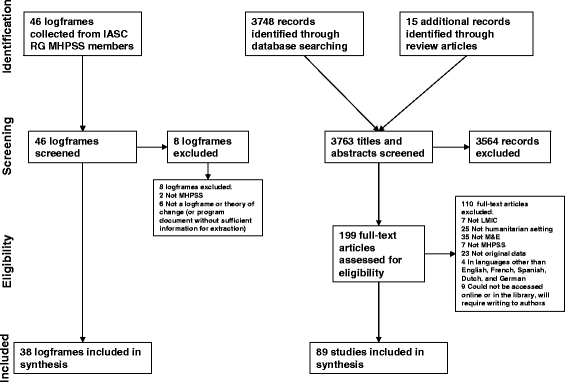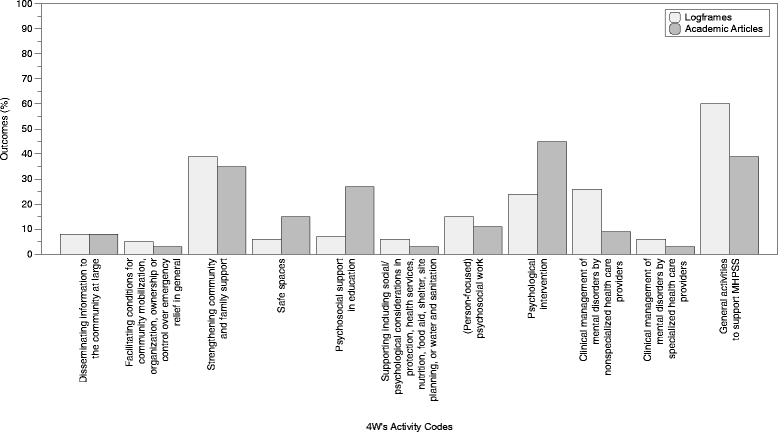Monitoring and evaluation of mental health and psychosocial support programs in humanitarian settings: a scoping review of terminology and focus
- PMID: 29560023
- PMCID: PMC5858133
- DOI: 10.1186/s13031-018-0146-0
Monitoring and evaluation of mental health and psychosocial support programs in humanitarian settings: a scoping review of terminology and focus
Abstract
Background: Monitoring and evaluation of mental health and psychosocial support (MHPSS) programs is critical to facilitating learning and providing accountability to stakeholders. As part of an inter-agency effort to develop recommendations on MHPSS monitoring and evaluation, this scoping review aimed to identify the terminology and focus of monitoring and evaluation frameworks in this field.
Methods: We collected program documents (logical frameworks (logframes) and theories of change) from members of the Inter-Agency Standing Committee Reference Group on MHPSS, and systematically searched the peer-reviewed literature across five databases. We included program documents and academic articles that reported on monitoring and evaluation of MHPSS in low- and middle-income countries describing original data. Inclusion and data extraction were conducted in parallel by independent reviewers. Thematic analysis was used to identify common language in the description of practices and the focus of each monitoring and evaluation framework. Logframe outcomes were mapped to MHPSS activity categories.
Results: We identified 38 program documents and 89 peer-reviewed articles, describing monitoring and evaluation of a wide range of MHPSS activities. In both program documents and peer-reviewed literature there was a lack of specificity and overlap in language used for goals and outcomes. Well-validated, reliable instruments were reported in the academic literature, but rarely used in monitoring and evaluation practices. We identified six themes in the terminology used to describe goals and outcomes. Logframe outcomes were more commonly mapped to generic program implementation activities (e.g. "capacity building") and those related to family and community support, while outcomes from academic articles were most frequently mapped to specialized psychological treatments.
Conclusions: Inconsistencies between the language used in research and practice and discrepancies in measurement have broader implications for monitoring and evaluation in MHPSS programs in humanitarian settings within low- and middle-income countries. This scoping review of the terminology commonly used to describe monitoring and evaluation practices and their focus within MHPSS programming highlights areas of importance for the development of a more standardized approach to monitoring and evaluation.
Keywords: Humanitarian settings; Logical framework; Low and middle-income countries; Mental health and psychosocial support; Monitoring and evaluation.
Conflict of interest statement
WT is Program Director of the Peter C. Alderman Foundation, an international non-governmental organization that is a member of the IASC Reference Group on Mental Health and Psychosocial Support.Springer Nature remains neutral with regard to jurisdictional claims in published maps and institutional affiliations.
Figures
Similar articles
-
Mental health and psychosocial support in humanitarian settings: a public mental health perspective.Epidemiol Psychiatr Sci. 2015 Dec;24(6):484-94. doi: 10.1017/S2045796015000827. Epub 2015 Sep 24. Epidemiol Psychiatr Sci. 2015. PMID: 26399635 Free PMC article.
-
Mental health and psychosocial support programmes for adults in humanitarian emergencies: a systematic review and meta-analysis in low and middle-income countries.BMJ Glob Health. 2019 Oct 1;4(5):e001484. doi: 10.1136/bmjgh-2019-001484. eCollection 2019. BMJ Glob Health. 2019. PMID: 31646006 Free PMC article.
-
A call for greater conceptual clarity in the field of mental health and psychosocial support in humanitarian settings.Epidemiol Psychiatr Sci. 2021 Jan 8;30:e5. doi: 10.1017/S2045796020001110. Epidemiol Psychiatr Sci. 2021. PMID: 33413736 Free PMC article.
-
Relevance or excellence? Setting research priorities for mental health and psychosocial support in humanitarian settings.Harv Rev Psychiatry. 2012 Jan-Feb;20(1):25-36. doi: 10.3109/10673229.2012.649113. Harv Rev Psychiatry. 2012. PMID: 22335180 Free PMC article.
-
Task-shifting for refugee mental health and psychosocial support: A scoping review of services in humanitarian settings through the lens of RE-AIM.Implement Res Pract. 2021 Mar 17;2:2633489521998790. doi: 10.1177/2633489521998790. eCollection 2021 Jan-Dec. Implement Res Pract. 2021. PMID: 37089989 Free PMC article.
Cited by
-
Factors Influencing Improvement of Trauma-Related Symptoms Among Somali Refugee Youth in Urban Kenya.Community Ment Health J. 2022 Aug;58(6):1179-1190. doi: 10.1007/s10597-021-00928-0. Epub 2022 Jan 11. Community Ment Health J. 2022. PMID: 35013831
-
Support interventions to promote health and wellbeing among women with health-related consequences following traumatic experiences linked to armed conflicts and forced migration: a scoping review.Arch Public Health. 2024 Jan 16;82(1):8. doi: 10.1186/s13690-023-01235-8. Arch Public Health. 2024. PMID: 38225672 Free PMC article.
-
Psychological and social interventions for the promotion of mental health in people living in low- and middle-income countries affected by humanitarian crises.Cochrane Database Syst Rev. 2024 May 21;5(5):CD014300. doi: 10.1002/14651858.CD014300.pub2. Cochrane Database Syst Rev. 2024. PMID: 38770799 Free PMC article.
-
Satisfaction with mental health and psycho-social support services provided to Syrians under temporary protection in Turkey, evidence from refugee health training centers.J Migr Health. 2020 Dec 10;1-2:100022. doi: 10.1016/j.jmh.2020.100022. eCollection 2020. J Migr Health. 2020. PMID: 34405173 Free PMC article.
-
Measuring sexual violence stigma in humanitarian contexts: assessment of scale psychometric properties and validity with female sexual violence survivors from Somalia and Syria.Confl Health. 2021 Dec 24;15(1):96. doi: 10.1186/s13031-021-00431-z. Confl Health. 2021. PMID: 34952621 Free PMC article.
References
-
- Steel Z, Chey T, Silove D, Marnane C, Bryant RA, van Ommeren M. Association of torture and other potentially traumatic events with mental health outcomes among populations exposed to mass conflict and displacement: a systematic review and meta-analysis. JAMA. 2009;302:537–549. doi: 10.1001/jama.2009.1132. - DOI - PubMed
-
- Kane JC, Luitel NP, Jordans MJ, Kohrt BA, Weissbecker I, Tol WA. Mental health and psychosocial problems in the aftermath of the Nepal earthquakes: findings from a representative cluster sample survey. Epidemiol Psychiatr Sci. 2017:1–10. https://www.cambridge.org/core/journals/epidemiology-and-psychiatric-sci.... - PMC - PubMed
-
- Inter-Agency Standing Committee (IASC). IASC guidelines on mental health and psychosocial support in emergency settings. Geneva: IASC; 2007. - PubMed
-
- The Sphere Project. Humanitarian charter and minimum standards in disaster response - 2011 edition. Geneva: IASC; 2011. - PubMed
Publication types
Grants and funding
LinkOut - more resources
Full Text Sources
Other Literature Sources
Research Materials



